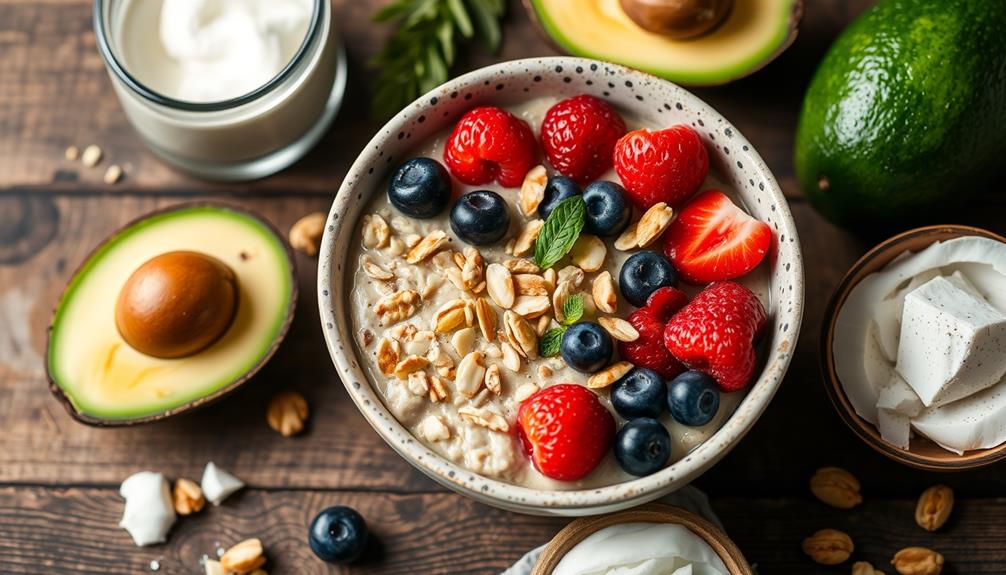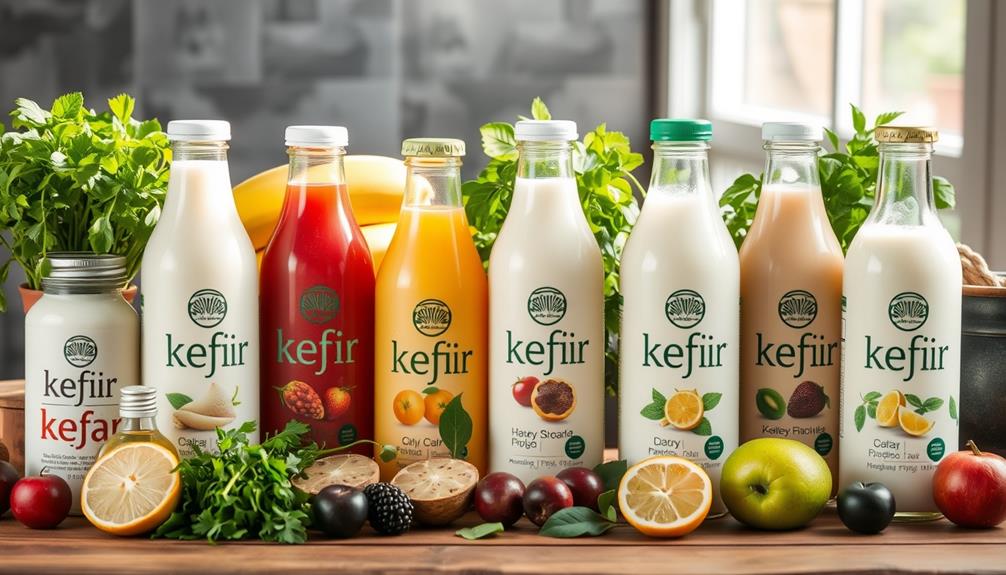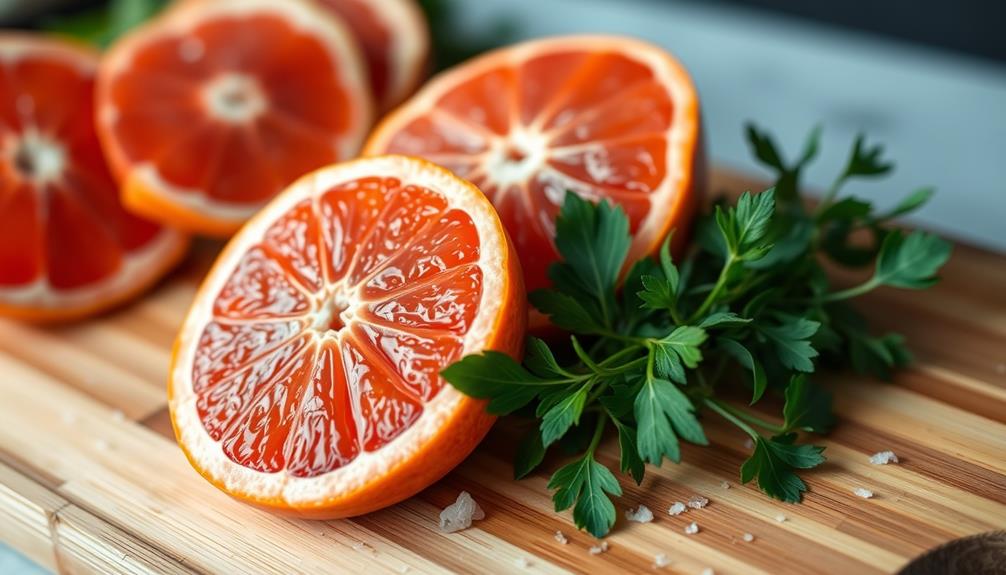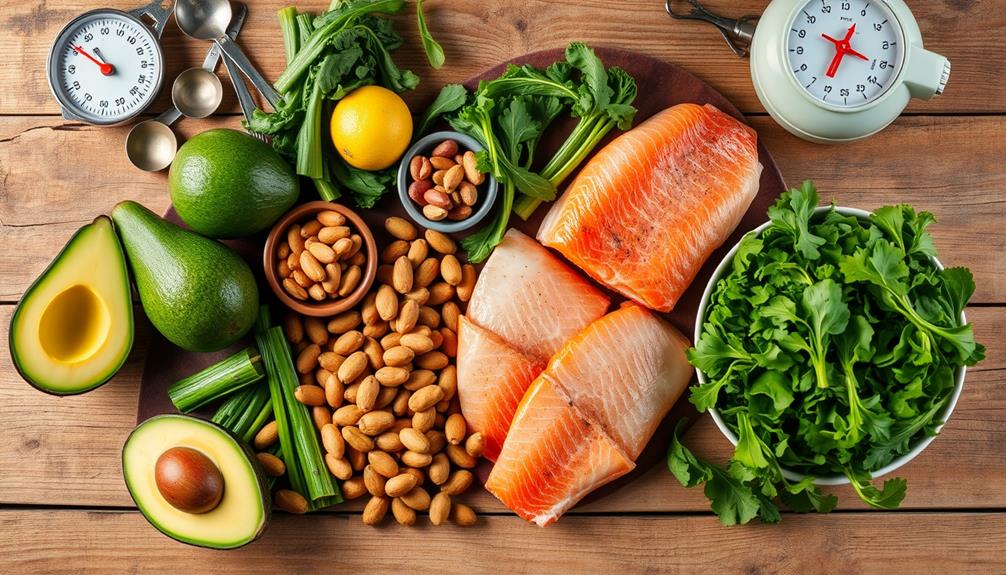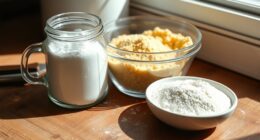To stay in ketosis, focus on low-carb dairy options like hard cheeses (cheddar, Parmesan, Gouda) and full-fat, plain yogurt or cream cheese, which are high in fat and low in carbs. Unsweetened almond milk and coconut milk can also be good plant-based alternatives. Always check labels for hidden sugars or additives, especially in flavored or processed products. Keep these tips in mind to help your keto journey, and more details await you below.
Key Takeaways
- Hard cheeses like cheddar, Parmesan, and Gouda are low in carbs and ideal for keto diets.
- Full-fat, unprocessed dairy such as plain yogurt and cream cheese are suitable in moderation.
- Unsweetened almond milk and coconut milk are keto-friendly plant-based milk alternatives.
- Check labels for added sugars or carbs in flavored or processed dairy products.
- Individuals with dairy sensitivities should opt for plant-based alternatives or consult healthcare professionals.

Wondering if dairy fits into your keto diet? The answer depends on your individual needs and preferences. For many, dairy can be a great source of fat, protein, and flavor, but it’s essential to weigh plant-based alternatives and dairy allergy considerations before making it a staple. If you’re lactose intolerant or allergic to dairy, you’ll want to explore non-dairy options that still align with your keto goals. Fortunately, there are plenty of plant-based alternatives like coconut milk, almond milk, and cashew-based cheeses that can satisfy your cravings without compromising ketosis or triggering allergies.
Dairy can be keto-friendly, but consider allergies and plant-based alternatives to stay in ketosis.
When it comes to dairy allergy considerations, reading labels becomes vital. Some processed cheeses and milk products may contain additives or hidden sources of carbs that can derail your keto plan. If you’re allergic or sensitive, sticking to whole, unprocessed dairy products like hard cheeses or full-fat plain yogurt might be safer choices, as they tend to have fewer added ingredients. Consider also that some individuals with dairy allergies find that even trace amounts of milk proteins can cause reactions, so it’s wise to test small quantities or consult with a healthcare professional before fully integrating dairy into your diet.
On the other hand, if you tolerate dairy well, many cheeses are highly keto-friendly. Hard cheeses like cheddar, Parmesan, and Gouda are low in carbs and high in fat, making them ideal for snacking or adding flavor to meals. Soft cheeses like cream cheese and full-fat ricotta are also good options, especially when used in moderation. These cheeses not only boost fat intake but also provide valuable nutrients like calcium and vitamin K2. When selecting dairy, opt for full-fat versions and avoid processed or flavored varieties that often contain added carbs or sugars.
Plant-based alternatives have surged in popularity, offering a versatile array of options that mimic dairy’s texture and flavor. Unsweetened almond milk, coconut yogurt, and vegan cheeses made from nuts or soy can be incorporated into your keto diet, especially if you’re avoiding dairy altogether. Just keep in mind that some plant-based products may contain added thickeners or sweeteners, so always check labels to keep carbs low. For those with dairy allergy considerations, these alternatives serve as safe, tasty options that align with your keto lifestyle, helping you maintain variety and satisfaction without risking adverse reactions.
Additionally, utilizing airless paint sprayers for home improvement projects can save you time and effort when updating your space.
Frequently Asked Questions
Are Plant-Based Cheeses Suitable for a Keto Diet?
Plant-based alternatives can be suitable for a keto diet if you choose options with low carbs. Many plant-based cheeses have fewer carbs and more fats, making them a good substitute. However, you should check the nutritional comparison because some contain added sugars or fillers. Always read labels to make sure they align with your keto goals, focusing on low carbohydrate content and high healthy fats.
How Much Dairy Can I Consume Daily on Keto?
You can typically enjoy 1 to 3 ounces of dairy daily on keto, but pay attention to dairy fat content—opt for high-fat options like cheese and cream. About 70% of the fat in aged cheeses comes from dairy fat, which helps keep you in ketosis. The cheese aging process concentrates flavors and fats, making aged cheeses ideal. Stick to your daily limits and choose full-fat, minimally processed dairy for best results.
Do Dairy Products Affect Ketosis Differently for Individuals?
Dairy products can affect your ketosis differently because of individual dairy digestion. Some people tolerate cheese and cream well, experiencing minimal impact on ketosis, while others find milk or certain dairy fats kick them out of ketosis. You need to monitor how your body responds, paying attention to any changes in energy levels or ketosis indicators. Adjust your dairy intake accordingly to maintain ketosis while enjoying your favorite dairy products.
Can Lactose-Free Dairy Still Impact Blood Sugar Levels?
Lactose-free dairy can still impact your blood sugar levels because lactose digestion isn’t the only factor. Some lactose-free products contain added sugars or carbs that can raise blood sugar, even if they don’t cause bloating or digestive issues. Always check labels for hidden carbs, and remember that individual responses vary. Monitoring your blood sugar helps you see how lactose-free dairy fits into your keto plan without unexpected spikes.
Are There Any Dairy Allergies to Consider on Keto?
If you have a dairy allergy, you need to avoid all dairy products during keto, as reactions can be severe. Dairy allergies are different from lactose intolerance and can cause symptoms like hives, swelling, or respiratory issues. Always check labels carefully and consider alternative keto-friendly options like coconut or almond milk. Staying within your keto restrictions means steering clear of dairy to prevent allergic reactions and stay healthy.
Conclusion
While dairy can be a helpful companion on your keto journey, it’s wise to enjoy it in moderation. Think of it as a flavorful guest—best when you invite it thoughtfully, not overstay your welcome. By choosing mindful portions and quality options, you can savor the benefits without letting it overshadow your goals. Remember, the sweetest success often comes from balance, allowing you to embrace what you love while gently steering toward your path.


